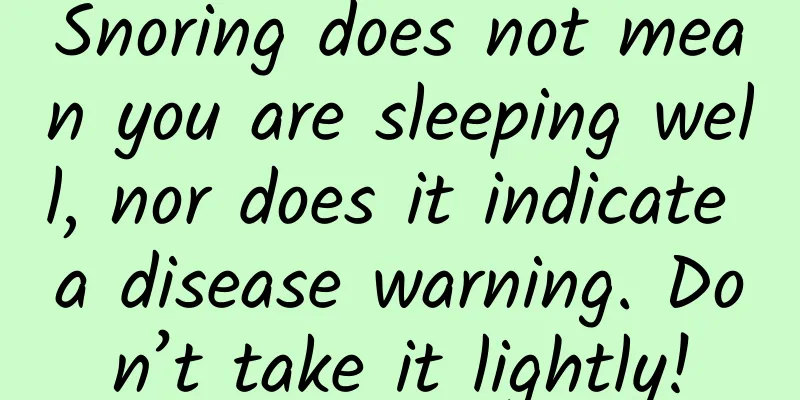Snoring does not mean you are sleeping well, nor does it indicate a disease warning. Don’t take it lightly!

|
Compiled by: Gong Zixin Keeps you awake at night Maybe it’s the person next to you who is snoring loudly? Pay attention! This is not just a nuisance to you It may also be an early warning sign of dangerously high blood pressure Recently, a new study by sleep experts from Flinders University in Australia found that people who snore frequently at night, especially overweight middle-aged men, are more likely to have high blood pressure and uncontrolled hypertension. The study, published in the journal NPJ Digital Medicine, is the largest to date and the first to explore the relationship between snoring and high blood pressure using multiple nighttime home monitoring technologies over a long period of time. "For the first time, we can objectively say there is a significant link between frequent nighttime snoring and high blood pressure," said lead author Dr Bastien Lechat from the Flinders Health and Medical Research Institute and the School of Medicine and Public Health. Dr. Lechat noted that 15% of the participants in the study (mostly overweight men) snored more than 20% of the time each night on average, and that such regular nighttime snoring has been associated with increased blood pressure and uncontrolled hypertension. Snoring is a common phenomenon that affects a large proportion of the population, but its negative health effects are often underestimated. Snoring and sleep apnea often overlap, suggesting that they share common causes. "We observed that people who snore frequently had almost double the risk of developing high blood pressure," said Professor Danny Eckert, Director of Sleep Health at Flinders University and senior author of the paper. Snoring itself may also be an early warning sign of high blood pressure, because poor sleep quality caused by snoring may increase the risk of high blood pressure. High blood pressure can lead to serious health problems such as heart failure, stroke, heart disease or kidney disease. Association between snoring duration and hypertension The study used sleep tracker data collected by sensors under the mattress to detect snoring and sleep apnea, as well as FDA-registered home blood pressure monitors, to survey more than 12,000 participants around the world over a nine-month period. Dr. Lechat noted that this study, by investigating the potential relationship between snoring, sleep apnea, and hypertension through objective assessment at home, revealed important insights into the potential consequences of snoring on the risk of hypertension. It also highlights the need to consider snoring as part of clinical care and management of sleep problems, especially in the context of hypertension management. He added: "This finding paves the way for further research into whether therapeutic interventions targeting snoring can reduce high blood pressure and the risks associated with it." Do women tend to snore lightly? It is often said that women tend to snore less frequently, softer and gentler than men. In fact, there is no difference in snoring intensity between the sexes. A study in the Journal of Clinical Sleep Medicine showed that women tend to underestimate the incidence and loudness of their snoring. The study showed that objectively measured snoring was detected in 88% of women (591 of 675), but only 72% of women reported that they snored. In contrast, men's objective snoring (92.6%) and self-reported snoring (93.1%) were almost the same. The study also found that women snore just as loudly as men, with the average maximum snoring intensity of 50 decibels for women and 51.7 decibels for men. About 49% of women had severe or very severe snoring, but only 40% of women thought they snored to this severity. If you or a family member's snoring is accompanied by lack of sleep, excessive sleepiness, or if breathing problems are observed during sleep, it is recommended that you seek guidance and help from a professional doctor as soon as possible. The cover image and images within this article are from the copyright gallery (or copyright holder). Any reproduction or use may lead to copyright disputes. |
<<: Reasonable nutrition promotes tumor recovery
Recommend
Why do many girls have a brown vertical line on their stomachs?
Reviewer of this article: Zhou Xiaobo, Doctor of ...
The bed rest posture for threatened abortion should start from this step
Threatened miscarriage is a sign of miscarriage, ...
What are the causes and treatments for heavy bleeding during pregnancy?
It is common to have a small amount of bleeding a...
40 days of pregnancy bleeding like menstruation
The forty days of pregnancy is the early stage of...
Is it good for postpartum women to eat salt?
During the confinement period, mothers must pay a...
Breast hyperplasia has blood flow signals
Breasts are a feature of female charm. They not o...
How to use the foreskin blocking ring
How to use the foreskin blocking ring? For people...
What does pelvic CT scan mainly detect?
Pelvic CT is a common examination method nowadays...
Breast pain every time menstruation comes
We all know that after a girl's period, her b...
Will low estradiol slow down the doubling of hcg?
If estradiol is low, it is important to adjust it...
Why do women experience premature menopause?
Menstruation is a normal physiological phenomenon...
#千万IP创科普# Vitamins are essential for good skin
Vitamins play a vital role in the health and beau...
How to protect private health
Women need to pay attention to many areas, especi...
Which sanitary napkin is good? Authoritative experts teach you how to choose!
As we all know, women will use the bathroom durin...
Symptoms of flavonoid body rupture
The symptoms of corpus luteum rupture are quite o...









